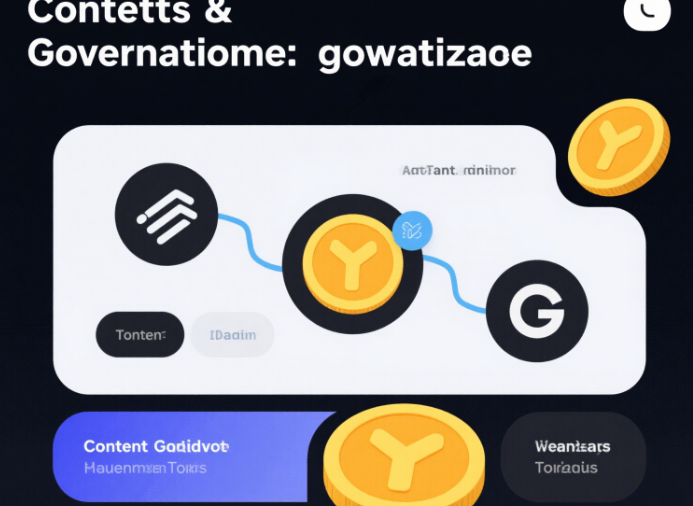In the dynamic landscape of blockchain and decentralized finance (DeFi), governance tokens have emerged as a cornerstone of decentralized decision-making. These digital assets grant holders the authority to vote on protocol upgrades, treasury allocations, and strategic direction, fundamentally reshaping how decentralized autonomous organizations (DAOs) and protocols operate. This article explores the evolution, mechanisms, and future potential of governance tokens, highlighting their role in fostering transparency, innovation, and community-driven ecosystems.
Understanding Governance Tokens: A Deep Dive
Governance tokens are cryptographic assets that enable stakeholders to participate in the governance of blockchain networks, protocols, or DAOs. Unlike traditional corporate governance models, where centralized entities make decisions, governance tokens distribute power among token holders, aligning incentives and ensuring decentralized control. For instance, tokens like UNI (Uniswap), AAVE (Aave), and CRV (Curve Finance) allow holders to propose and vote on critical changes, such as fee structures, liquidity pool additions, or protocol upgrades .
Key Features of Governance Tokens
- Voting Rights: Token holders can vote on proposals that affect the protocol’s development, ensuring decisions reflect community consensus.
- Economic Incentives: Tokens often come with rewards for participation, such as staking rewards or a share of protocol fees, encouraging active engagement .
- Decentralization: By distributing decision-making authority, governance tokens reduce reliance on central authorities, enhancing security and resilience.
The Role of Governance Tokens in Decentralized Systems
Governance tokens serve as the backbone of decentralized ecosystems, enabling:
- Transparent Decision-Making: On-chain voting records ensure all stakeholders can audit proposals and outcomes, fostering trust .
- Innovation Acceleration: Communities can rapidly test and implement new features, such as cross-chain integrations or AI-driven risk management tools .
- Stakeholder Alignment: Token holders have a vested interest in the protocol’s success, aligning their actions with long-term sustainability .
For example, Aave’s governance token (AAVE) allows holders to vote on risk parameters, such as collateral ratios and interest rates, ensuring the protocol adapts to market conditions . Similarly, Curve Finance’s CRV token holders manage liquidity pools and incentivize stablecoin trading, driving efficiency in decentralized exchanges .
Key Features of Effective Governance Tokens
To drive meaningful change, governance tokens must balance inclusivity, security, and efficiency:
- Voting Mechanisms: Quadratic voting, which weights votes based on the number of tokens held, mitigates the “plutocracy” risk where large holders dominate decisions .
- Tokenomics: Fair distribution models, such as liquidity mining and airdrops, ensure broad participation. For instance, Uniswap’s UNI token was initially distributed to early users, democratizing governance .
- Security Measures: Smart contract audits and multi-signature wallets protect against exploits, as seen in MakerDAO’s MKR token governance framework .
Real-World Examples of Governance Tokens in Action
Aave: Redefining DeFi Lending
Aave’s governance token (AAVE) has revolutionized decentralized lending by allowing users to vote on protocol upgrades, such as introducing new assets or adjusting borrowing limits. In 2025, Aave’s governance model expanded to support cross-chain governance, enabling token holders to influence multiple blockchain networks simultaneously .

Curve Finance: Optimizing Stablecoin Liquidity
Curve’s CRV token holders manage liquidity pools for stablecoins, ensuring low slippage and high capital efficiency. In 2025, Curve introduced “Curve Lite,” a streamlined version of its DEX, allowing DAOs to deploy customized liquidity solutions with minimal governance overhead .
MakerDAO: Decentralizing Monetary Policy
MakerDAO’s MKR token holders govern the DAI stablecoin, adjusting parameters like stability fees and collateral ratios to maintain peg stability. The protocol’s governance framework has evolved to include AI-driven risk management tools, enhancing resilience against market volatility .
Challenges and Criticisms Surrounding Governance Tokens
Despite their promise, governance tokens face significant hurdles:
- Low Voter Turnout: Many token holders remain inactive, leaving decisions to a small subset of participants. For example, Compound’s governance proposals often attract less than 1% of token holders .
- Centralization Risks: Early token allocations to founders or investors can concentrate power, undermining decentralization. Projects like SushiSwap faced backlash when founders sold large token holdings, destabilizing governance .
- Regulatory Uncertainty: As governments worldwide regulate crypto assets, governance tokens may face compliance challenges. The EU’s MiCA framework, for instance, requires DAOs to disclose token distribution models and voting procedures .
Future Trends in Governance Token Evolution
- AI-Enhanced Governance: In 2025, AI agents are increasingly used to automate voting, analyzing proposals and executing decisions based on predefined criteria. For example, DAOs like Compound are testing AI-driven governance tools that predict the impact of proposals .
- Cross-Chain Interoperability: Projects like Polkadot and Cosmos enable governance tokens to operate across multiple blockchains, fostering collaboration between ecosystems .
- Sustainability and ESG Integration: Governance tokens are being used to enforce environmental, social, and governance (ESG) standards. For instance, tokens like FORTH (Ampleforth) incentivize eco-friendly mining practices .
- Modular Governance Frameworks: DAOs are adopting modular systems, where separate modules handle treasury management, protocol upgrades, and community grants, improving efficiency .
Conclusion: The Future of Governance Tokens
Governance tokens are pivotal in driving decentralized innovation, enabling communities to shape the future of blockchain ecosystems. While challenges like centralization and regulatory compliance persist, advancements in AI, cross-chain interoperability, and modular governance offer promising solutions.
At Bitora, we empower users to navigate this evolving landscape by providing 实时 insights into governance token trends, market data, and DAO developments. Stay ahead of the curve with our comprehensive analysis and tools, designed to help you leverage the full potential of decentralized governance.
For the latest updates on governance tokens and DAO governance, visit Bitora today.
Bitora | Your Gateway to Decentralized Finance Insights









Leave A Reply